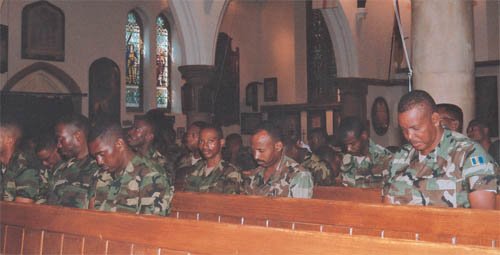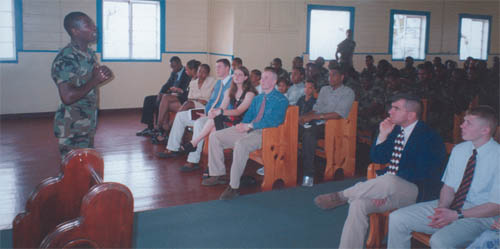|
|||||||||||||||||||||||||||||||
| Home > Info Centre > Publications > Alert 2000 > Serving in Uniform | |||||||||||||||||||||||||||||||
|
|
Every Christian soldier, at some point, has to face the question of how to rationalize his Christian faith with the ‘profession of arms’. To any person who is of the view that the Christian life is at odds with military service I would wish to testify to the contrary. I know that I am a born-again Christian and have been for many years while serving in the JDF. I realize that I have no righteousness of my own and that in the judgement of a holy and just God I would have no hope for eternity. So, I trusted my life to the Lord Jesus Christ who gave his life on the cross as an offering for my sin. On the cross, God laid on him the iniquity of us all, making him who knew no sin to bear mine that I might become the son God desires. Now Christ lives in me, and I stand as a sinner saved by grace. The chief problem that some folk perceive for the serving Christian is that a soldier is a fighting machine with a mission often to kill. Now, killing is taking the life of another human being, and is deemed to be in conflict with the commandment not to kill, and the commandment to love. The Christian soldier may indeed have to kill in the line of duty but, he can approach his task without the fear of breaking God’s laws. I am taught that the Hebrew word used for kill (ratsach) in the Ten Commandments may more correctly be translated murder. The meaning would therefore be that we should not commit murder. The teachers of the law certainly held this interpretation. The law prescribed the punishment of death for certain offences including murder, and judicial killings for the purpose of maintaining justice and punishing evil, is well established. Individuals are instructed in the scriptures not to avenge themselves, and not to retaliate in an evil way. God said vengeance belonged to Him, He would repay. Sometimes God used supernatural acts like the flood and the burning of Sodom to punish and destroy persons for their evil deeds. At other times He used individuals like King David, and others to execute His righteous acts, which included waging war and carrying out the death penalty. Civil authority is sanctioned in the scriptures to uphold justice (Romans 13: 1-7). Here the point is made that the king’s soldiers would not bear arms in vain. By force of arms, the civil authority is to ensure that evil is punished and that righteousness is rewarded. This will ensure a peaceable existence in the land. Quite often, it is because punishment for evil deeds is not done swiftly, that so much evil continues to be perpetrated.
There is no evidence that any of these soldiers discontinued military service, nor is there a command in the New Testament that a Christian should not be a soldier. Instead there is a general mandate given to Christians by Paul to remain in the calling in which they are called (1 Cor 7: 20). There are also several references to the life of a soldier that are used to encourage Christians in their walk of faith. Far from being in discord, the discipline of a godly man facilitates his effectiveness as a warrior. Just examine some of the traits of the maturing Christian: He recognizes and respects authority. (1 Peter 2:13) He is patient in suffering, and renders honourable, unselfish service as a duty unto the Lord. (Romans 5:3-5) He acts justly, he shows mercy, and he has humility before his maker. (Micah 6:8) He is at peace with his maker. This helps to keep his conscience alive and to hold him accountable to God’s standard of scriptural holiness. (Romans 5:1; 2 Cor 4:2) He possesses a positive ‘can do’ attitude because he is confident of the presence of his God who strengthens him, thereby enabling him to do all things through Christ. (Philippians 4:13) He has conquered fear through love. (1 John 4:18) He has learnt how to be content with his wages. (Luke 3:14) He is determined in obedience to his maker, to be a husband who loves his wife and a father who trains up his children. (Ephesians 5:28, Ephesians 6:4) The JDF has always looked after the spiritual welfare of soldiers, and there is an increasing number of soldiers who are displaying the courage to step away from the crowd and to take a stand on the Lord’s side. More and more soldiers are being emboldened to make their faith known. Padre’s hours are intended to be a part of each Unit’s training programme and Units are rostered regularly to attend church services. In addition, the doors of the chapel are opened every day and the JDF Prayer Group encourages soldiers and civilian staff to meet for prayer during the lunch hour each day. In conclusion, let us note that, in many ways, especially during certain kinds of operations soldiers often pass through the ‘valley of the shadow of death’. We experience many sobering moments that allow reflection on the fundamental questions: Who am I? Why am I here? Where am I heading? The Christian soldier is able to pass through that valley with confidence because of his faith. Can you?
|
||||||||||||||||||||||||||||||
|
|
|||||||||||||||||||||||||||||||


 It would be worth our while to
consider what happened to the soldiers we encounter in the New Testament. Christ said of
one of these soldiers, that he had found in him greater faith than in any other man in
Israel. Another soldier believed in Christ, as He hung there on the cross. Yet another
soldier was named among the early converts of the apostle Peter and received the Holy
Ghost immediately on his conversion and his entire family was saved (Acts 10).
It would be worth our while to
consider what happened to the soldiers we encounter in the New Testament. Christ said of
one of these soldiers, that he had found in him greater faith than in any other man in
Israel. Another soldier believed in Christ, as He hung there on the cross. Yet another
soldier was named among the early converts of the apostle Peter and received the Holy
Ghost immediately on his conversion and his entire family was saved (Acts 10).